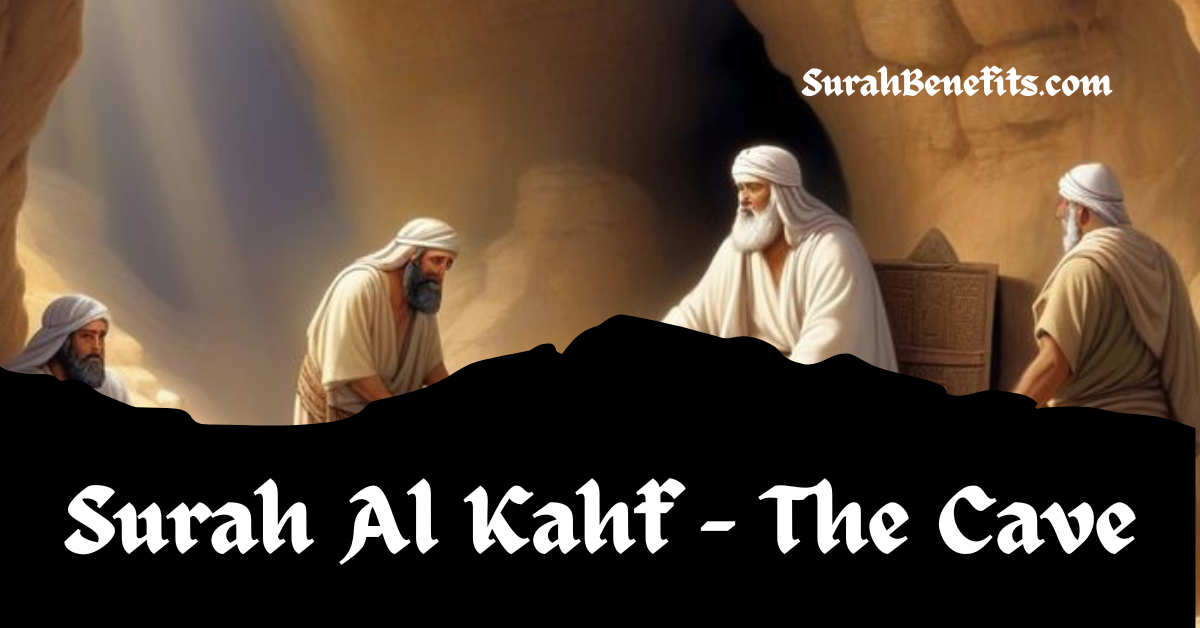Introduction
Surah Al-Kahf, which means “The Cave,” is the 18th Surah in the Quran.
Surah Al-Kahf was revealed in Makkah and consists of 110 verses (Ayahs).
Reciting the first 10 or last 10 verses of this Surah offers protection from the trials associated with Dajjal (the Antichrist).
The Surah features four main stories:
- The narrative of the People of the Cave (Ashab al-Kahf)
- The tale of the man with two gardens
- The account of Prophet Musa (Moses) and Khidr
- The story of Dhul-Qarnayn
Table of Contents

Listen Surah Al-KAhf

Read Surah Al-Kahf online
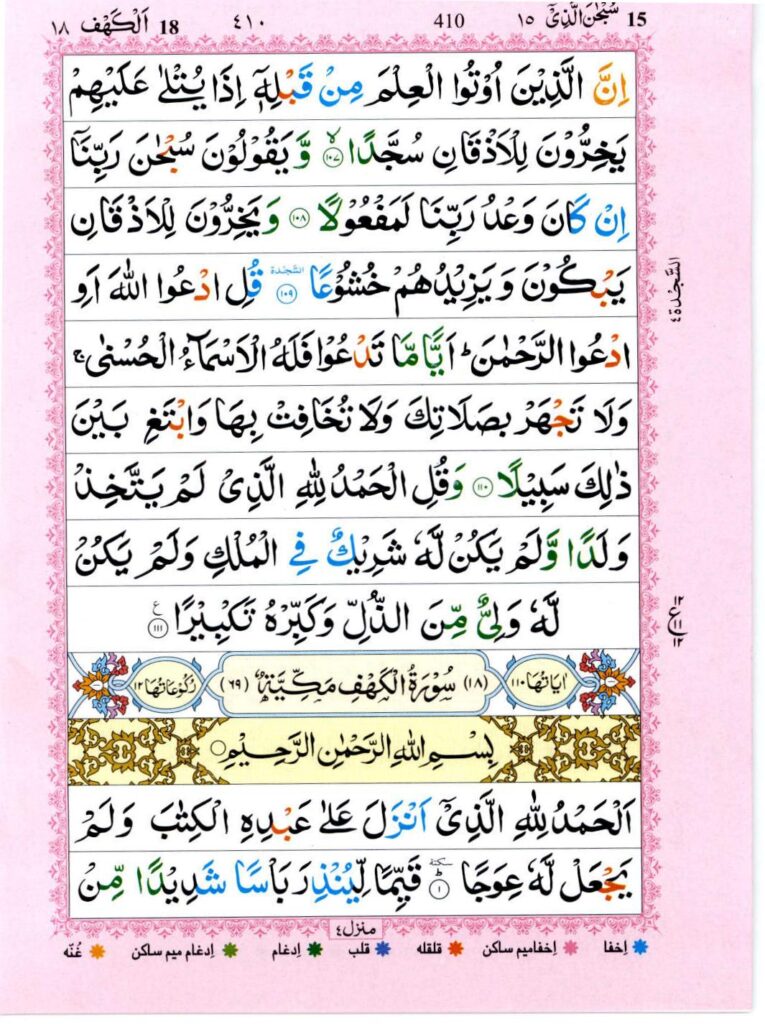
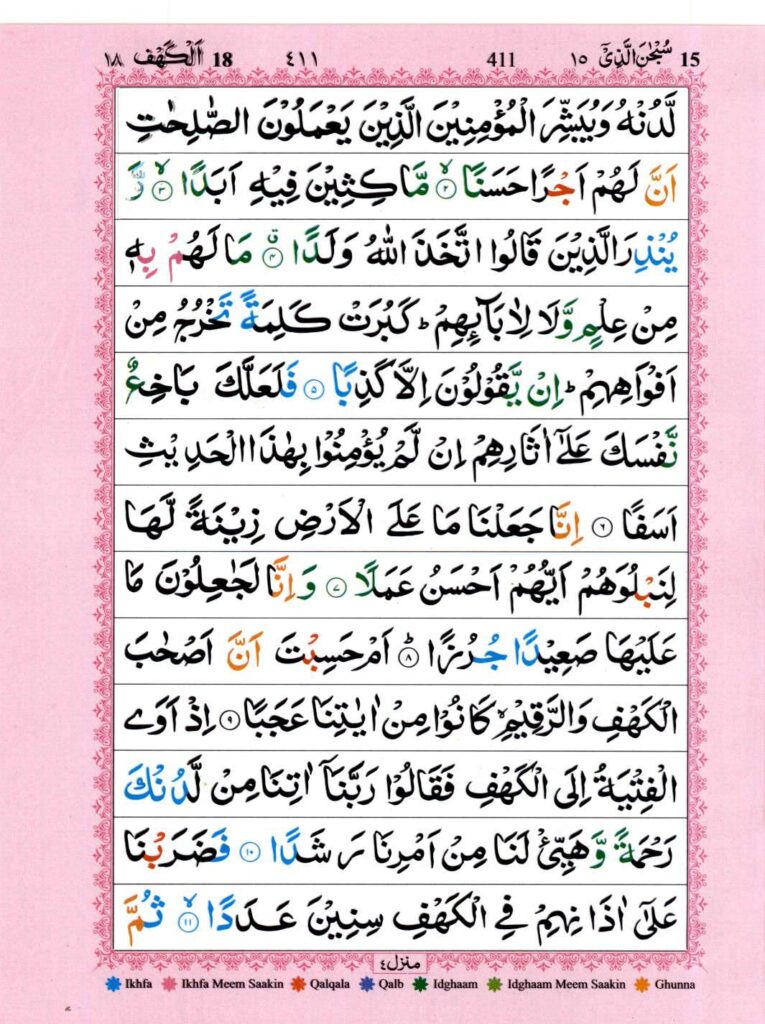
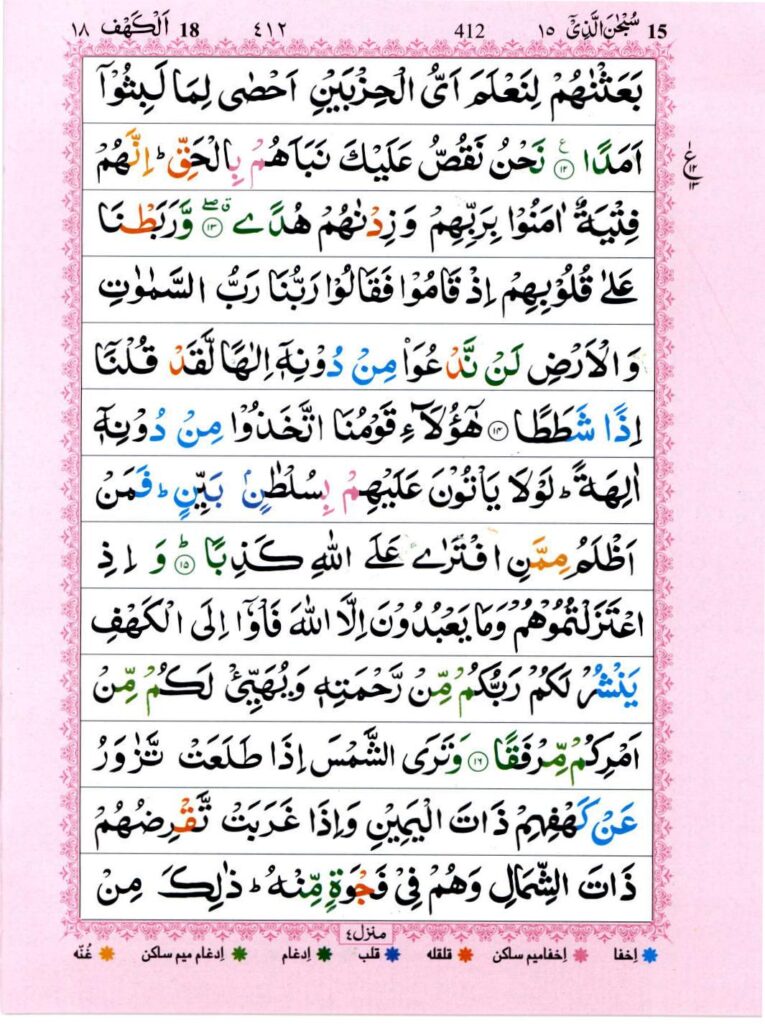
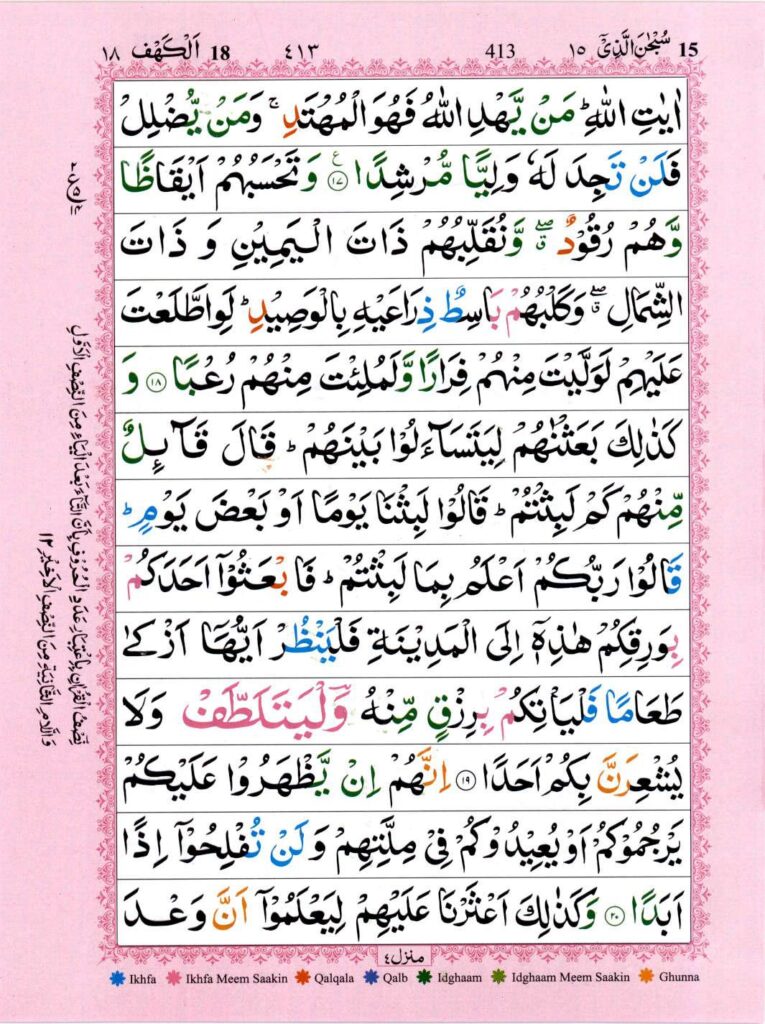
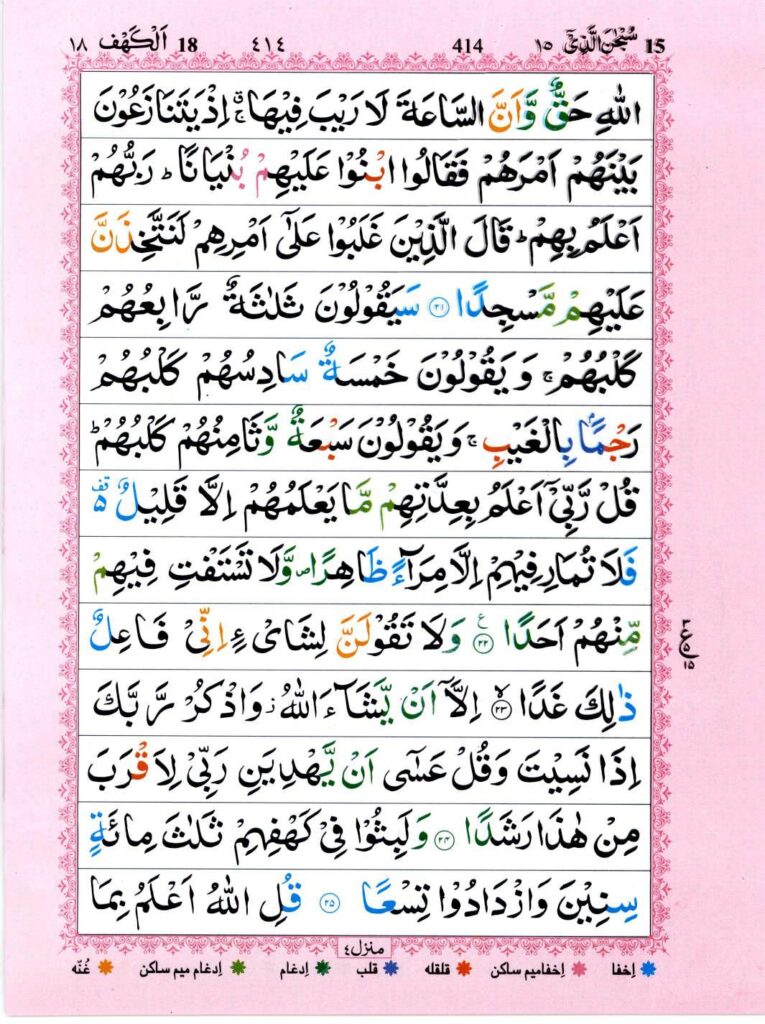
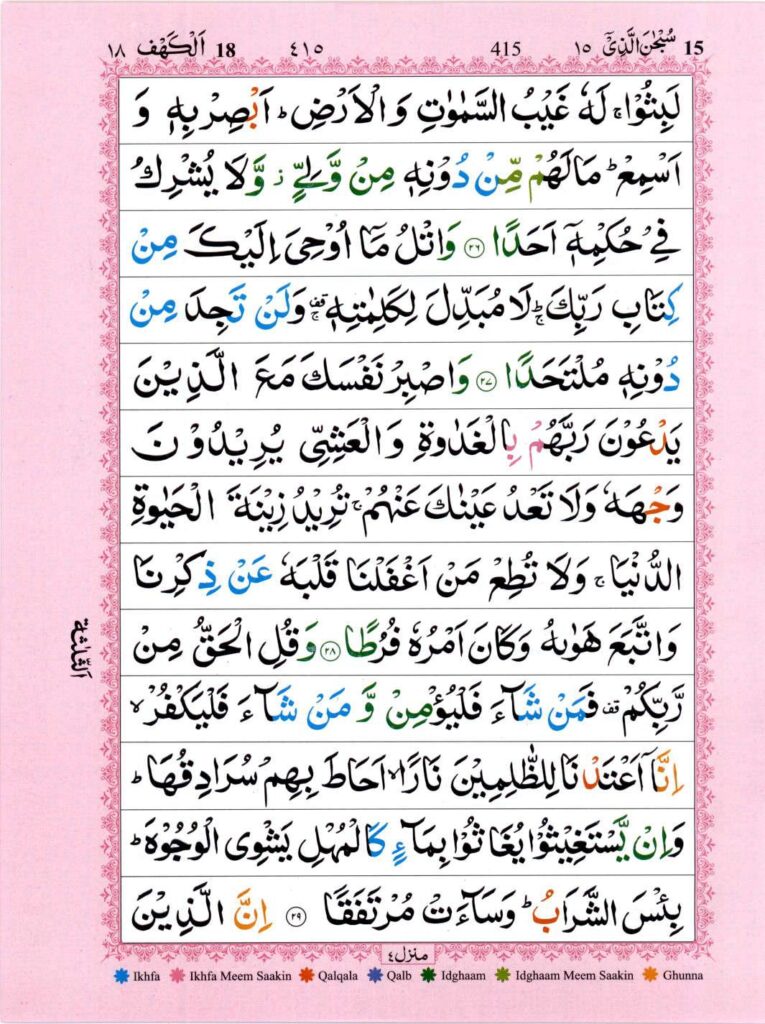
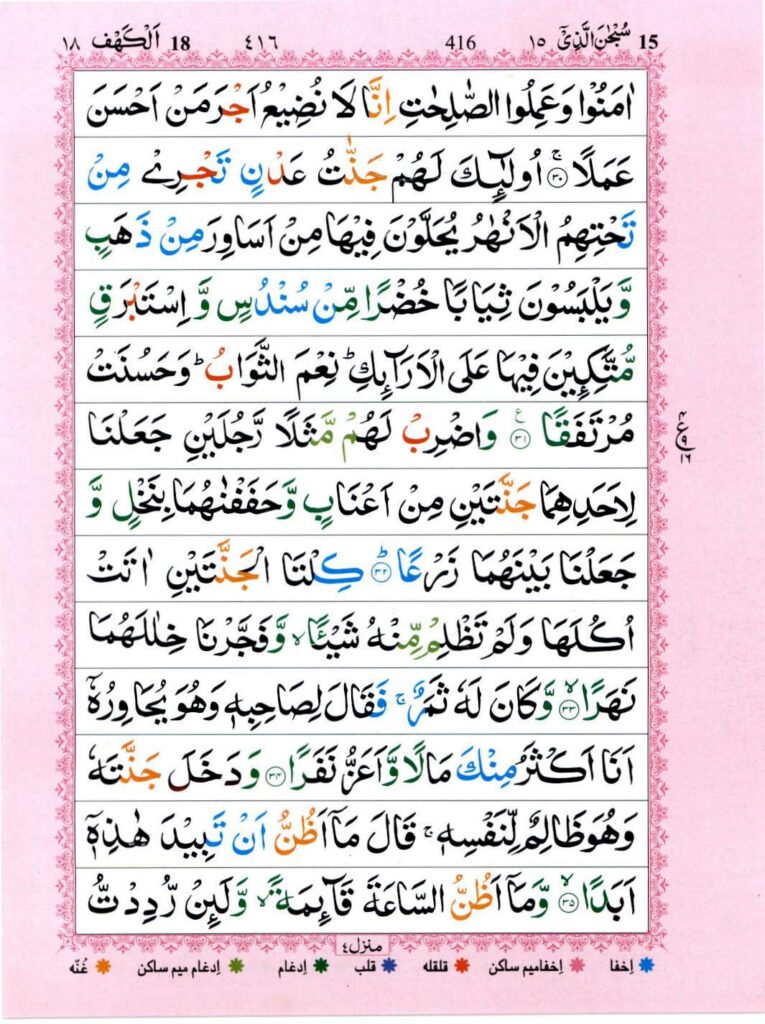
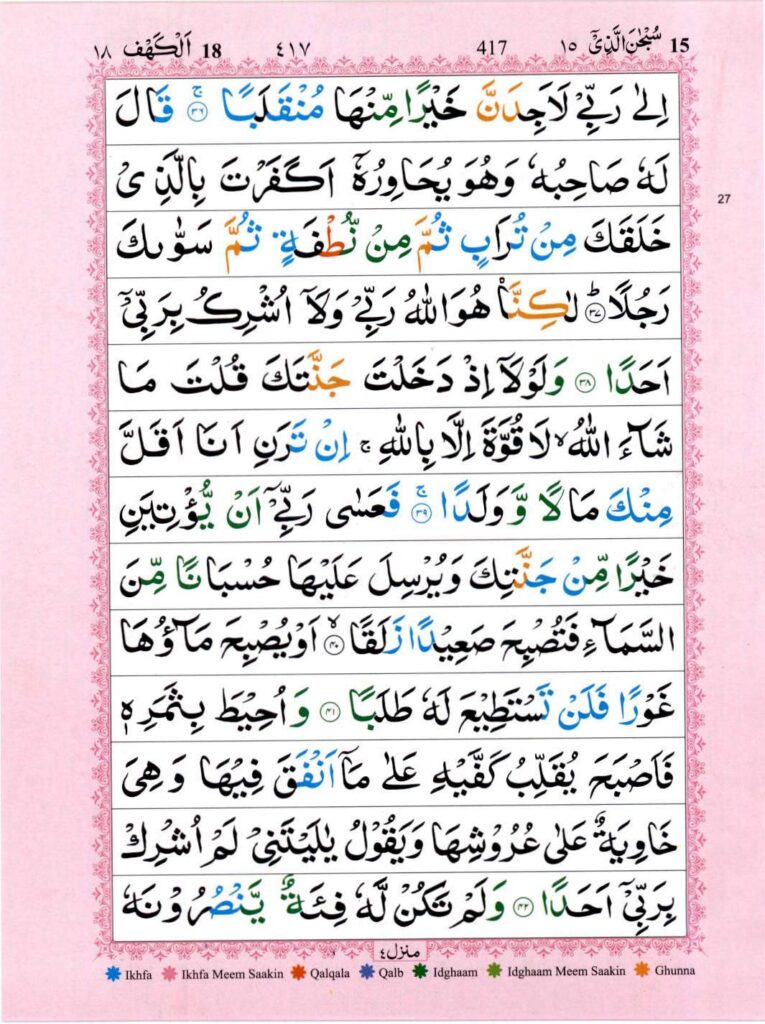
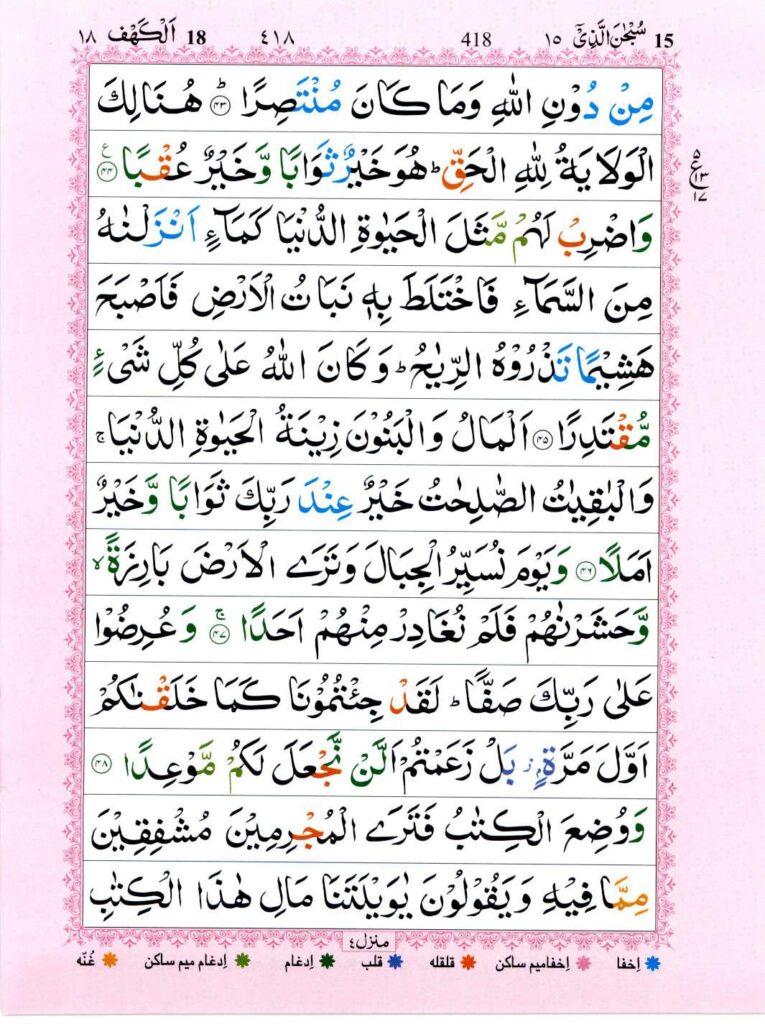
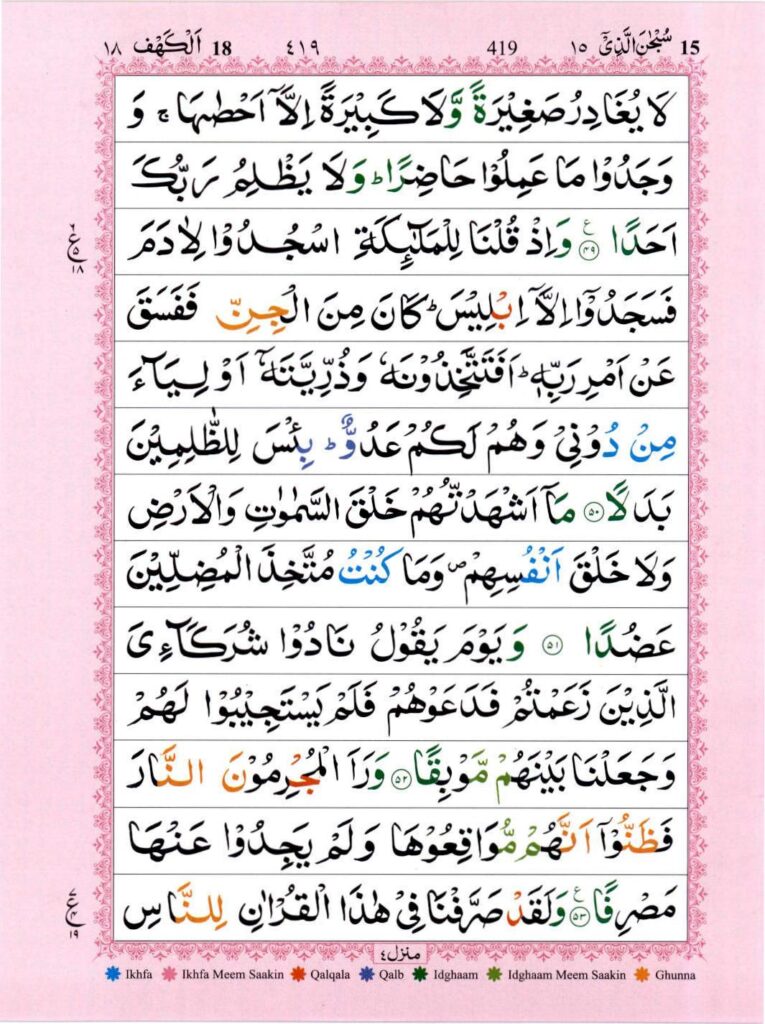
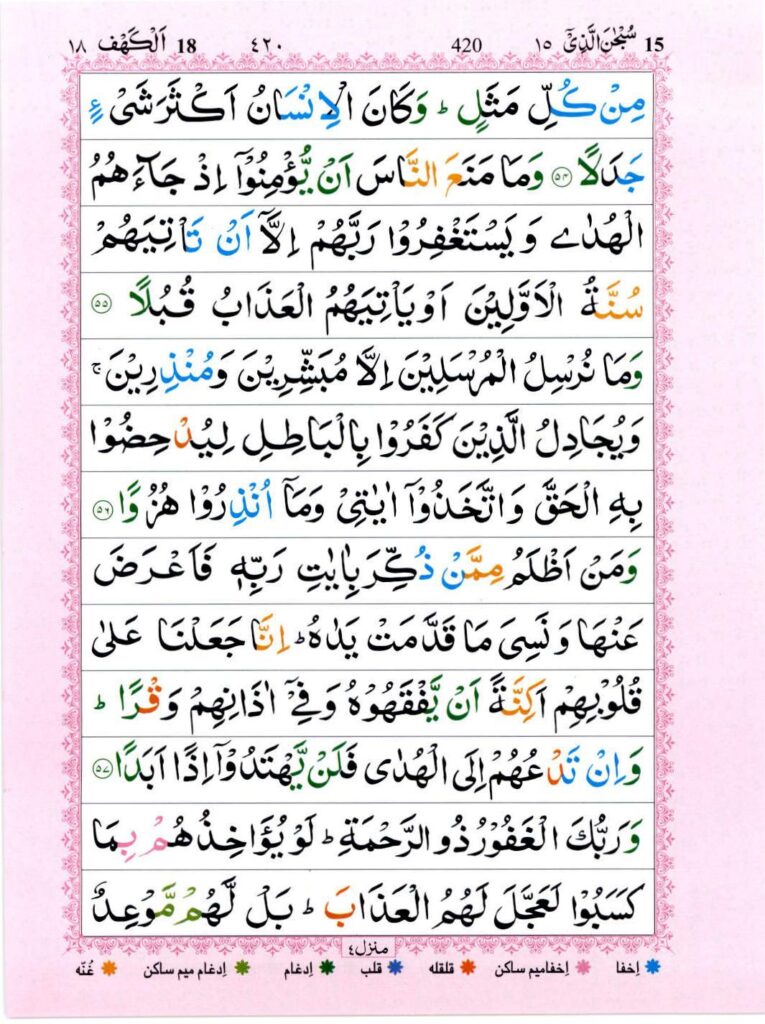
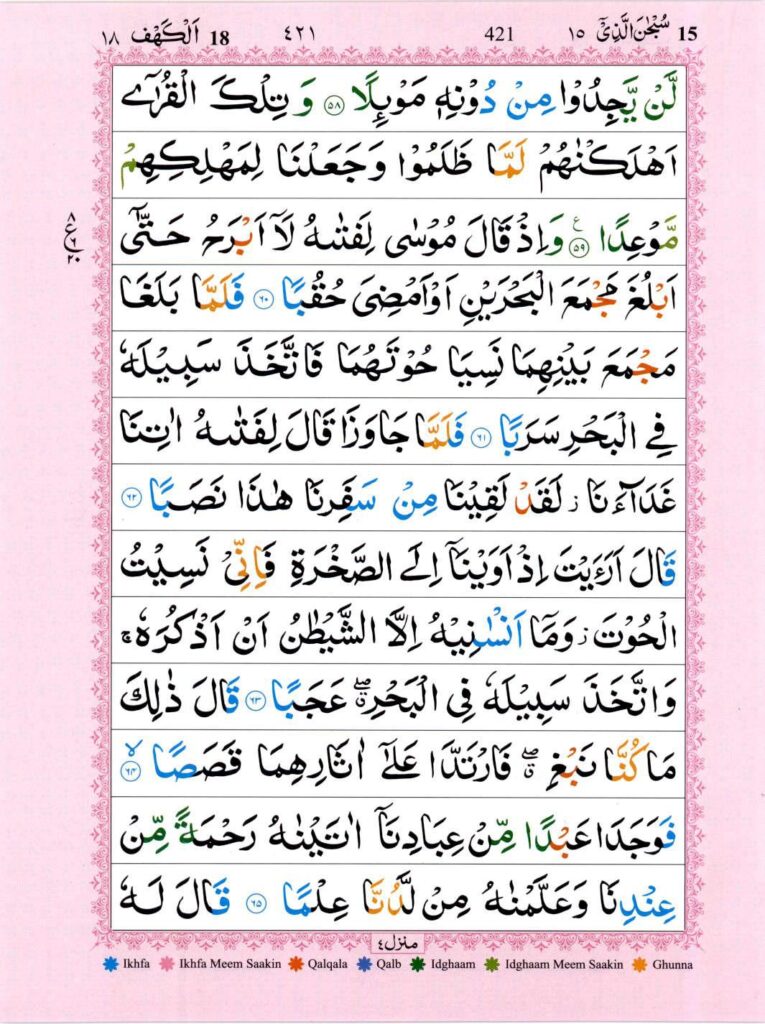
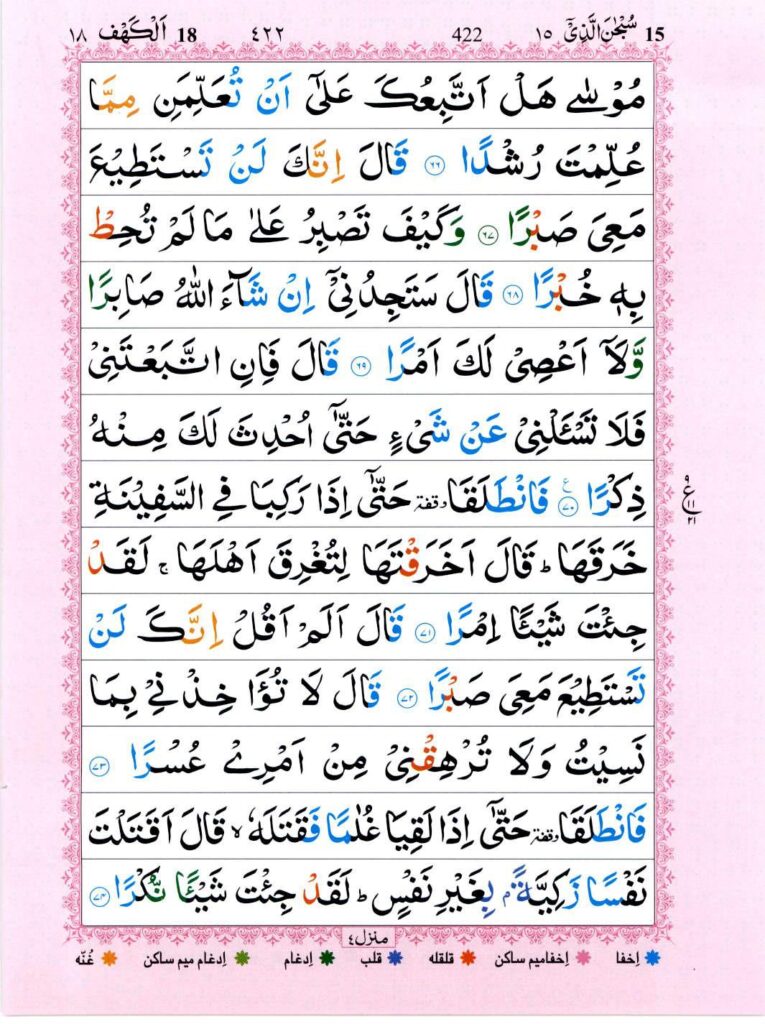
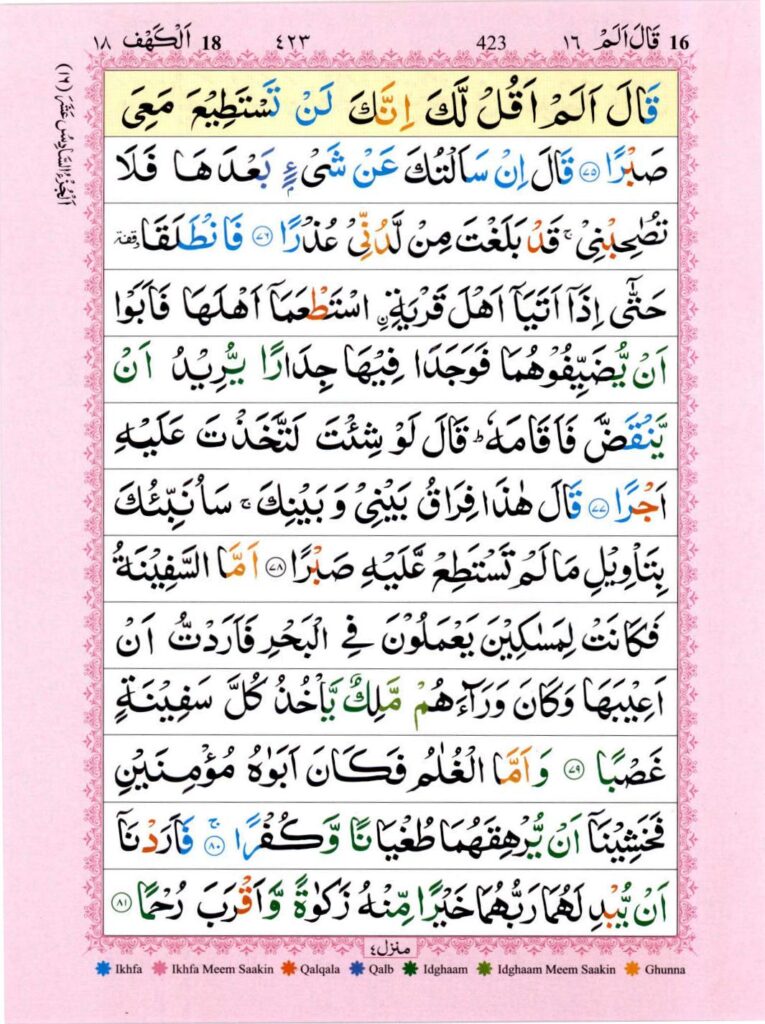
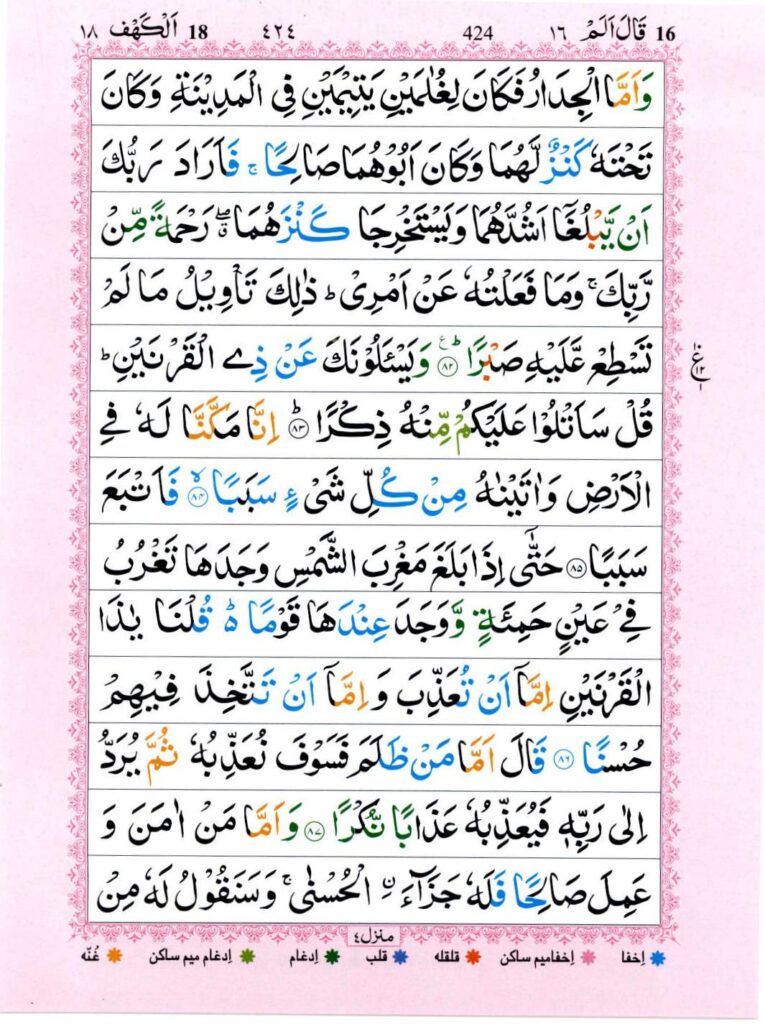
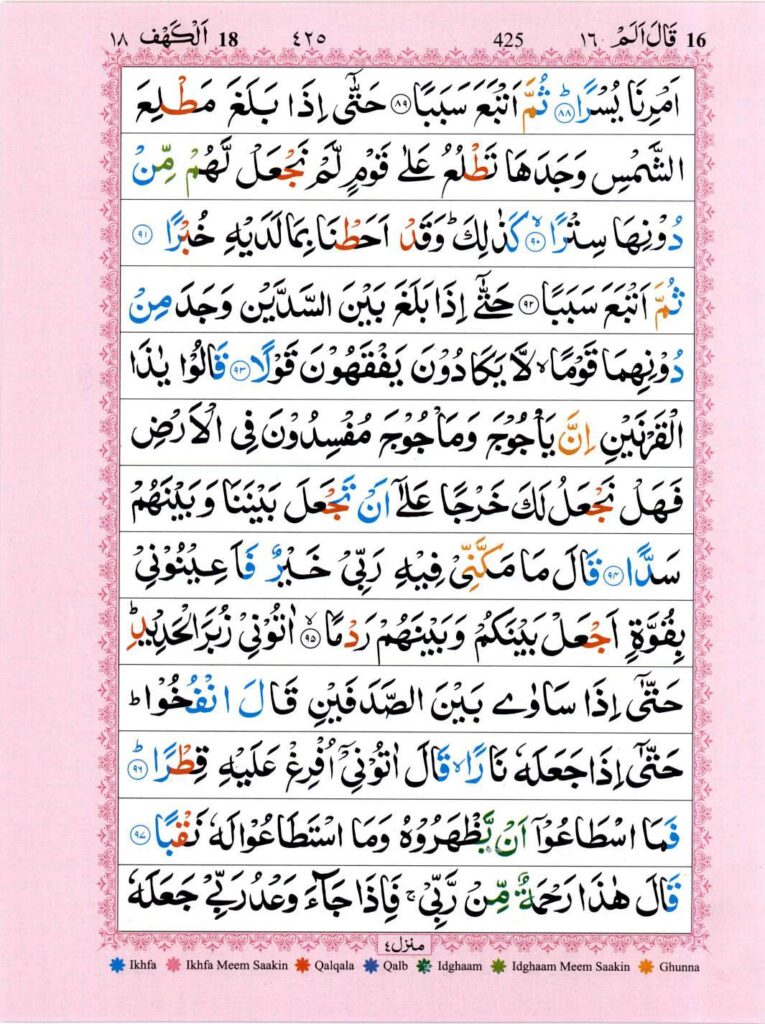
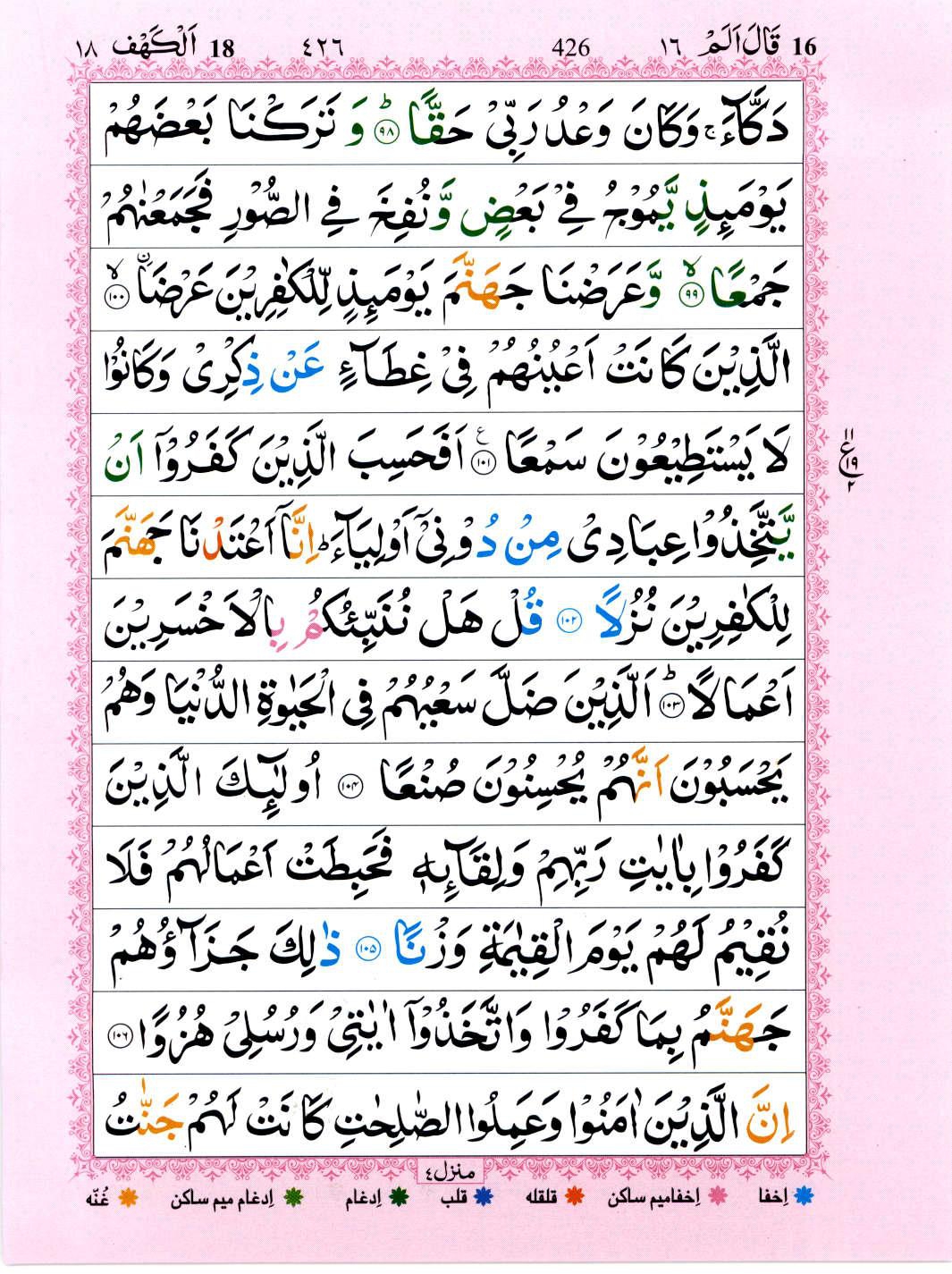
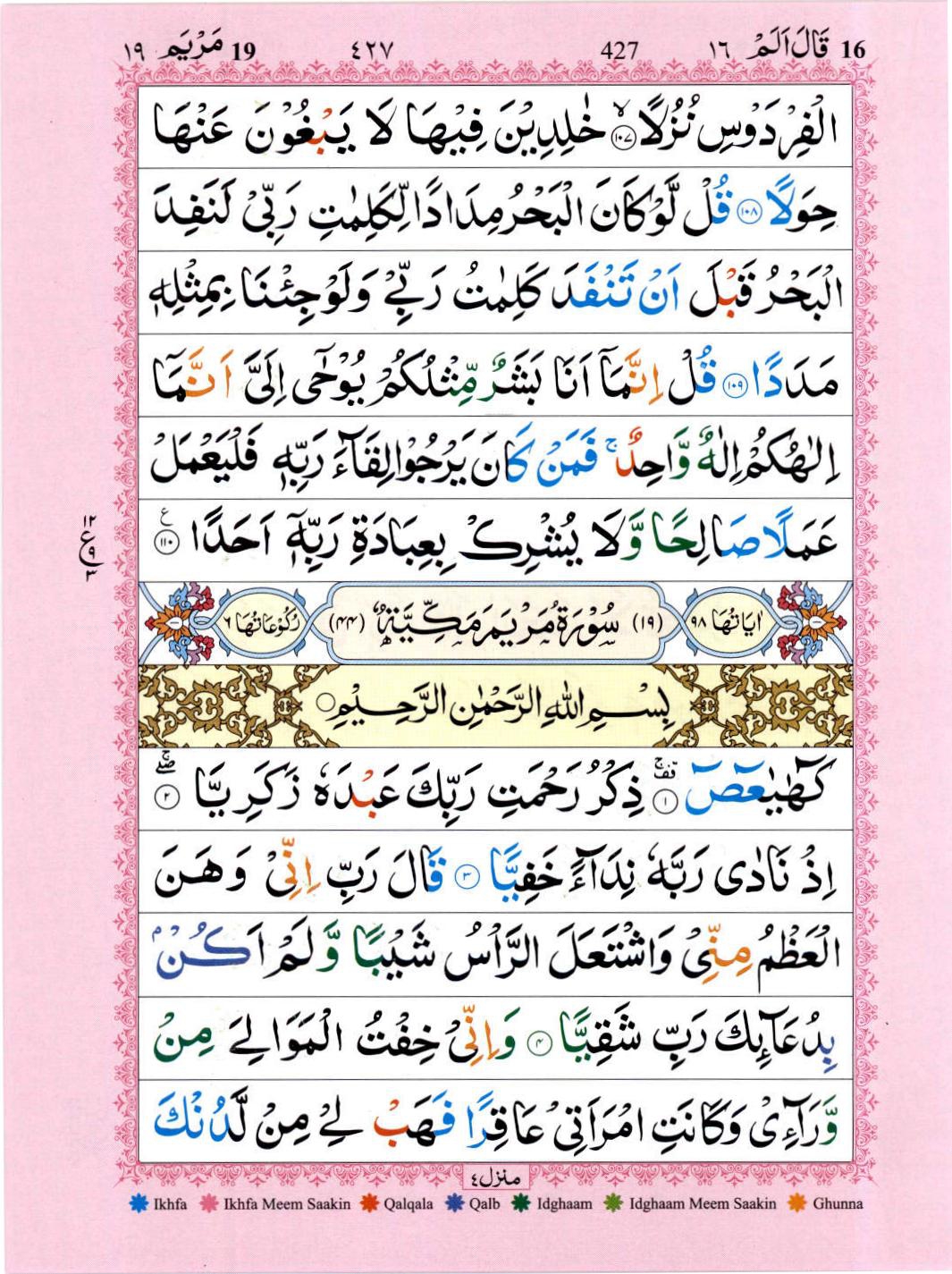

Video: Surah Al-Kahf explanation in English

Verses: Surah Al-Kahf
(1) All praise is due to Allah, who has sent down upon His Servant the Book and has not made therein any deviance.
(2) [He has made it] straight, to warn of severe punishment from Him and to give good tidings to the believers who do righteous deeds that they will have a good reward.
(3) In which they will remain forever.
(4) And to warn those who say, “Allah has taken a son.”
(5) They have no knowledge of it, nor do their forefathers. Grave is the word that comes out of their mouths; they speak not except a lie.
(6) Then perhaps you would kill yourself through grief over them, [O Muhammad], if they do not believe in this message, [and] out of sorrow.
(7) Indeed, We have made that which is on the earth adornment for it that We may test them [as to] which of them is best in deed.
(8) And indeed, We will make that which is upon it [into] a barren ground.
(9) Or have you thought that the companions of the cave and the inscription were, among Our signs, a wonder?
(10) [Mention] when the youths retreated to the cave and said, “Our Lord, grant us from Yourself mercy and prepare for us from our affair right guidance.”
(11) So We cast [a cover of sleep] over their ears within the cave for a number of years.
(12) Then We awakened them to know which of the two parties was most accurate in calculating how long they had remained.
(13) It is We who relate to you, [O Muhammad], their story in truth. Indeed, they were youths who believed in their Lord, and We increased them in guidance.
(14) And We made firm their hearts when they stood up and said, “Our Lord is the Lord of the heavens and the earth. Never will we invoke besides Him any deity. We would have certainly spoken, then, an excessive transgression.
(15) These, our people, have taken besides Him deities. Why do they not bring for [worship of] them a clear authority? And who is more unjust than one who invents about Allah a lie?”
(16) [The youths said to one another], “And when you have withdrawn from them and that which they worship other than Allah, retreat to the cave. Your Lord will spread out for you of His mercy and will prepare for you from your affair facility.”
(17) And [had you been present], you would see the sun when it rose, inclining away from their cave on the right, and when it set, passing away from them on the left, while they were [laying] within an open space thereof. That was from the signs of Allah. He whom Allah guides is the [rightly] guided, but he whom He leaves astray – never will you find for him a protecting guide.
(18) And you would think them awake, while they were asleep. And We turned them to the right and to the left, while their dog stretched his forelegs at the entrance. If you had looked at them, you would have turned from them in flight and been filled with fear of them.
(19) And similarly, We awakened them that they might question one another. Said a speaker from among them, “How long have you remained [here]?” They said, “We have remained a day or part of a day.” They said, “Your Lord is most knowing of how long you remained. So send one of you with this silver coin of yours to the city and let him look to which is the best of food and bring you provision from it and let him be cautious. And let no one be aware of you.
(20) Indeed, if they come to know of you, they will stone you or return you to their religion. And never would you succeed, then – ever.”
(21) And similarly, We caused them to be found that they who found them would know that the promise of Allah is truth and that of the Hour there is no doubt. That was when they disputed among themselves about their affair and then said, “Construct over them a structure. Their Lord is most knowing about them.” Said those who prevailed in the matter, “We will surely take [for ourselves] over them a masjid.”
(22) They [i.e., people] will say there were three, the fourth of them being their dog; and they will say there were five, the sixth of them being their dog – guessing at the unseen; and they will say there were seven, and the eighth of them was their dog. Say, [O Muhammad], “My Lord is most knowing of their number. None knows them except a few. So do not argue about them except with an obvious argument and do not inquire about them among [the speculators] from anyone.”
(23) And never say of anything, “Indeed, I will do that tomorrow,”
(24) Except [when adding], “If Allah wills.” And remember your Lord when you forget [it] and say, “Perhaps my Lord will guide me to what is nearer than this to right conduct.”
(25) And they remained in their cave for three hundred years and exceeded by nine.
(26) Say, “Allah is most knowing of how long they remained. He has [knowledge of] the unseen [aspects] of the heavens and the earth. How Seeing is He and how Hearing! They have not besides Him any protector, and He shares not His legislation with anyone.”
(27) And recite, [O Muhammad], what has been revealed to you of the Book of your Lord. There is no changer of His words, and never will you find in other than Him a refuge.
(28) And keep yourself patient [by being] with those who call upon their Lord in the morning and the evening, seeking His face. And let not your eyes pass beyond them, desiring adornments of the worldly life, and do not obey one whose heart We have made heedless of Our remembrance and who follows his desire and whose affair is ever [in] neglect.
(29) And say, “The truth is from your Lord, so whoever wills – let him believe; and whoever wills – let him disbelieve.” Indeed, We have prepared for the wrongdoers a fire whose walls will surround them. And if they call for relief, they will be relieved with water like murky oil, which scalds [their] faces. Wretched is the drink, and evil is the resting place.
(30) Indeed, those who have believed and done righteous deeds – indeed, We will not allow to be lost the reward of any who did well in deeds.
(31) Those will have gardens of perpetual residence; beneath them rivers will flow. They will be adorned therein with bracelets of gold and will wear green garments of fine silk and brocade, reclining therein on adorned couches. Excellent is the reward, and good is the resting place.
(32) And present to them an example of two men: We granted to one of them two gardens of grapevines, and We bordered them with palm trees and placed crops within them.
(33) Each of the two gardens produced its fruit and did not fall short thereof in anything. And We caused to gush forth within them a river.
(34) And he had fruit, so he said to his companion while he was conversing with him, “I am greater than you in wealth and mightier in [numbers of] men.”
(35) And he entered his garden while he was unjust to himself. He said, “I do not think that this will perish – ever.
(36) And I do not think the Hour will occur. And even if I should be brought back to my Lord, I will surely find better than this as a return.”
(37) His companion said to him while he was conversing with him, “Have you disbelieved in He who created you from dust and then from a sperm-drop and then proportioned you [as] a man?
(38) But as for me, He is Allah, my Lord, and I do not associate with my Lord anyone.
(39) And why did you, when you entered your garden, not say, ‘What Allah willed [has occurred]; there is no power except in Allah’? Although you see me less than you in wealth and children,
(40) It may be that my Lord will give me something better than your garden and will send upon it a calamity from the sky, and it will become a smooth, dusty ground,
(41) Or its water will become sunken [into the earth], so you would never be able to seek it.”
(42) And his fruits were encompassed [by ruin], so he began to turn his hands about [in dismay] over what he had spent on it, while it had collapsed upon its trellises, and said, “Oh, I wish I had not associated with my Lord anyone.”
(43) And there was for him no company to aid him other than Allah, nor could he defend himself.
(44) There the authority is [completely] for Allah, the Truth. He is best in reward and best in outcome.
(45) And present to them the example of the life of this world: [It is] like rain which We send down from the sky, and the vegetation of the earth mingles with it, and then it becomes dry remnants, scattered by the winds. And Allah is ever, over all things, Perfect in Ability.
(46) Wealth and children are [but] adornment of the worldly life. But the enduring good deeds are better to your Lord for reward and better for [one’s] hope.
(47) And [warn of] the Day when We will remove the mountains and you will see the earth prominent, and We will gather them, and We will not leave behind from them anyone.
(48) And they will be presented before your Lord in rows, [and He will say], “You have certainly come to Us just as We created you the first time. But you claimed that We would not make for you an appointment.”
(49) And the record [of deeds] will be placed [open], and you will see the criminals fearful of that within it, and they will say, “Oh, woe to us! What is this book that leaves nothing small or great except that it has enumerated it?” And they will find what they did present [before them]. And your Lord does injustice to no one.
(50) And [mention] when We said to the angels, “Prostrate to Adam,” and they prostrated, except for Iblis. He was of the jinn and departed from the command of his Lord. Then will you take him and his descendants as allies other than Me while they are enemies to you? Wretched it is for the wrongdoers as an exchange.
(51) I did not make them witness to the creation of the heavens and the earth or to the creation of themselves, and I would not have taken the misguiders as assistants.
(52) And [warn of] the Day when He will say, “Call My ‘partners’ whom you claimed,” and they will invoke them, but they will not respond to them. And We will put between them a valley of destruction.
(53) And the criminals will see the Fire and will be certain that they are to fall therein. And they will find from it no way elsewhere.
(54) And We have certainly diversified in this Qur’an for the people from every [kind of] example. But man has ever been, most of anything, [prone to] dispute.
(55) And nothing has prevented the people from believing when guidance came to them and from asking forgiveness of their Lord except that there [must] befall them the [accustomed] precedent of the former peoples or that the punishment should come [directly] before them.
(56) And We send not the messengers except as bringers of good tidings and warners. And those who disbelieve dispute by [using] falsehood to [attempt to] invalidate thereby the truth and have taken My verses, and that of which they are warned, in ridicule.
(57) And who is more unjust than one who is reminded of the verses of his Lord but turns away from them and forgets what his hands have put forth? Indeed, We have placed over their hearts coverings, lest they understand it, and in their ears deafness. And if you invite them to guidance – they will never be guided, then – ever.
(58) And your Lord is the Forgiving, Full of Mercy. If He were to impose blame upon them for what they earned, He would have hastened for them the punishment. But for them is an appointment from which they will never find an escape.
(59) And those cities – We destroyed them when they wronged, and We made for their destruction an appointed time.
(60) And [mention] when Moses said to his boy [servant], “I will not cease [traveling] until I reach the junction of the two seas or continue for a long period.”
(61) But when they reached the junction between them, they forgot their fish, and it took its course into the sea, slipping away.
(62) So when they had passed beyond it, [Moses] said to his boy, “Bring us our morning meal. We have certainly suffered in this, our journey, [much] fatigue.”
(63) He said, “Did you see when we retired to the rock? Indeed, I forgot the fish. And none made me forget it except Satan – that I should mention it. And it took its course into the sea amazingly.”
(64) [Moses] said, “That is what we were seeking.” So they returned, following their footprints.
(65) And they found a servant from among Our servants to whom We had given mercy from Us and had taught him from Us a [certain] knowledge.
(66) Moses said to him, “May I follow you on [the condition] that you teach me from what you have been taught of sound judgement?”
(67) He said, “Indeed, with me you will never be able to have patience.
(68) And how can you have patience for what you do not encompass in knowledge?”
(69) [Moses] said, “You will find me, if Allah wills, patient, and I will not disobey you in [any] order.”
(70) He said, “Then if you follow me, do not ask me about anything until I mention it to you.”
(71) So they set out, until when they had embarked on the ship, he [i.e., Khidr] tore it open. [Moses] said, “Have you torn it open to drown its people? You have certainly done a grave thing.”
(72) [Khidr] said, “Did I not say that with me you would never be able to have patience?”
(73) [Moses] said, “Do not blame me for what I forgot and do not cover me in my matter with difficulty.”
(74) So they set out, until when they met a boy, he [i.e., Khidr] killed him. [Moses] said, “Have you killed a pure soul for other than [having killed] a soul? You have certainly done a deplorable thing.”
(75) [Khidr] said, “Did I not tell you that with me you would never be able to have patience?”
(76) [Moses] said, “If I should ask you about anything after this, then do not keep me as a companion. You have obtained from me an excuse.”
(77) So they set out, until when they came to the people of a town, they asked its people for food, but they refused to offer them hospitality. And they found therein a wall about to collapse, so he [i.e., Khidr] restored it. [Moses] said, “If you wished, you could have taken for it a payment.”
(78) [Khidr] said, “This is parting between me and you. I will inform you of the interpretation of that about which you could not have patience.
(79) As for the ship, it belonged to poor people working at sea. So I intended to cause defect in it as there was after them a king who seized every [good] ship by force.
(80) And as for the boy, his parents were believers, and we feared that he would overburden them by transgression and disbelief.
(81) So we intended that their Lord should substitute for them one better than him in purity and nearer to mercy.
(82) And as for the wall, it belonged to two orphan boys in the city, and there was beneath it a treasure for them, and their father had been righteous. So your Lord intended that they reach maturity and extract their treasure, as a mercy from your Lord. And I did it not of my own accord. That is the interpretation of that about which you could not have patience.”
(83) And they ask you, [O Muhammad], about Dhul-Qarnayn. Say, “I will recite to you about him a report.”
(84) Indeed, We established him upon the earth, and We gave him to everything a way [i.e., means].
(85) So he followed a way
(86) Until, when he reached the setting of the sun, he found it [as if] setting in a spring of dark mud, and he found near it a people. Allah said, “O Dhul-Qarnayn, either you punish [them] or else adopt among them [a way of] goodness.”
(87) He said, “As for one who wrongs, we will punish him. Then he will be returned to his Lord, and He will punish him with a terrible punishment [i.e., Hellfire].
(88) But as for one who believes and does righteousness, he will have a reward of the best [i.e., Paradise], and we will speak to him from our command with ease.”
(89) Then he followed a way
(90) Until, when he came to the rising of the sun, he found it rising on a people for whom We had not made against it any shield.
(91) Thus. And We had encompassed [all] that he had in knowledge.
(92) Then he followed a way
(93) Until, when he reached [a pass] between two mountains, he found beside them a people who could hardly understand [his] speech.
(94) They said, “O Dhul-Qarnayn, indeed Gog and Magog are [great] corrupters in the land. So may we assign for you an expenditure that you might make between us and them a barrier?”
(95) He said, “That in which my Lord has established me is better [than what you offer], but assist me with strength; I will make between you and them a dam.
(96) Bring me sheets of iron” – until, when he had leveled [them] between the two mountain walls, he said, “Blow [with bellows],” until when he had made it [like] fire, he said, “Bring me, that I may pour over it molten copper.”
(97) So Gog and Magog were unable to pass over it, nor were they able [to effect] in it any penetration.
(98) [Dhul-Qarnayn] said, “This is a mercy from my Lord; but when the promise of my Lord comes, He will make it level, and ever is the promise of my Lord true.”
(99) And We will leave them that day surging over each other, and [then] the Horn will be blown, and We will assemble them in [one] assembly.
(100) And We will present Hell that Day to the disbelievers, on display –
(101) Those whose eyes had been within a cover [removed] from My remembrance, and they were not able to hear.
(102) Then do those who disbelieve think that they can take My servants instead of Me as allies? Indeed, We have prepared Hell for the disbelievers as a lodging.
(103) Say, [O Muhammad], “Shall We inform you of the greatest losers in deeds?
(104) Those whose effort is lost in worldly life, while they think that they are doing well in work.
(105) Those are the ones who disbelieve in the signs of their Lord and in the meeting with Him. So their deeds have become worthless, and We will not assign to them on the Day of Resurrection any importance.
(106) That is their reward – Hell, for what they denied and for their taking My signs and My messengers in ridicule.
(107) Indeed, those who have believed and done righteous deeds – they will have the Gardens of Paradise as a lodging,
(108) Wherein they abide eternally. They will not desire from it any transfer.
(109) Say, “If the sea were ink for [writing] the words of my Lord, the sea would have been exhausted before the words of my Lord were exhausted, even if We brought the like of it in supplement.”
(110) Say, “I am only a man like you, to whom has been revealed that your god is one God. So whoever would hope for the meeting with his Lord – let him do righteous work and associate none in the worship of his Lord.”

Virtue- Surah Al-Kahf
1. Shield Against Dajjal:
Reciting Surah Al-Kahf, especially on Fridays, is believed to offer protection from the trials associated with the Dajjal (the Antichrist). This practice is based on teachings from the Prophet Muhammad (peace be upon him).
2. Spiritual Illumination:
The Surah is known to provide spiritual clarity and guidance, helping believers navigate life’s challenges with a deeper understanding.
3. Intercessory Benefits:
Regular recitation of Surah Al-Kahf is said to intercede on behalf of its readers on the Day of Judgment, bringing divine mercy and forgiveness.
4. Blessings and Forgiveness:
Frequent recitation of this Surah is associated with receiving blessings and forgiveness from Allah, enhancing spiritual well-being.
5. Strengthens Faith:
The Surah discusses themes of patience, reliance on Allah, and unwavering faith, reinforcing a believer’s trust in Allah during difficult times.
6. Overcoming Hardships:
The narratives within Surah Al-Kahf, such as the story of the People of the Cave, serve as examples of faith and perseverance in overcoming adversity.
7. Promotes Regular Worship:
The practice of reciting Surah Al-Kahf on Fridays encourages consistent worship and spiritual mindfulness throughout the week.
8. Understanding Trials and Patience:
The Surah’s stories, including those of Prophet Musa (Moses) and Khidr, teach valuable lessons about enduring trials with patience and understanding divine wisdom.
9. Reflection on the Hereafter:
The Surah emphasizes the transient nature of worldly life and encourages believers to focus on the Hereafter, aligning their actions with eternal goals.
10. Encourages Gratitude and Humility:
The Surah’s teachings remind believers to be grateful for Allah’s blessings and to remain humble, avoiding arrogance.
11. Strengthens Community Relations:
The moral values imparted in Surah Al-Kahf, such as empathy and cooperation, foster stronger bonds within the community.
12. Provides Comfort in Difficult Times:
The stories in Surah Al-Kahf highlight Allah’s care and protection, offering reassurance to believers facing their own challenges.
13. Encourages Consistent Spiritual Practice:
The regular recitation of Surah Al-Kahf helps establish a routine of worship and reflection, maintaining a connection with Allah.
14. Increases Knowledge of Prophetic Traditions:
The Surah’s narratives offer insights into the lives of Prophets, deepening understanding of their teachings and relevance.
15. Facilitates Personal Development:
The lessons from Surah Al-Kahf encourage personal growth, self-discipline, and a stronger spiritual connection with Allah.
16. Inspires Focus and Determination:
The story of Dhul-Qarnayn exemplifies leadership and perseverance, motivating believers to remain focused and determined in their endeavors.
17. Balances Worldly and Spiritual Life:
Surah Al-Kahf stresses the importance of balancing material pursuits with spiritual growth, reminding believers to maintain this equilibrium.
18. Guidance for Decision-Making:
The story of Prophet Musa and Khidr illustrates divine wisdom, offering guidance on making decisions with faith and patience.
19. Reminder of Wealth’s Impermanence:
The narrative about the owner of two gardens highlights the fleeting nature of wealth and status, encouraging humility and detachment from materialism.
20. Encourages Reflection on Trials:
The Surah’s accounts of various trials help believers understand and navigate their own challenges with faith and perseverance.
21. Strengthens Faith Commitment:
By reflecting on the steadfastness of the People of the Cave and other figures, believers are encouraged to remain committed to their faith.
22. Inspires Social Responsibility:
Dhul-Qarnayn’s efforts to help the oppressed highlight the importance of social justice and responsibility, inspiring believers to contribute positively to society.
23. Encouragement During Doubts:
The Surah provides reassurance to those experiencing doubts or difficulties, reinforcing the importance of faith and trust in Allah.
24. Awareness of Divine Wisdom:
Surah Al-Kahf encourages recognition and appreciation of divine wisdom behind Allah’s decrees, even when they are not immediately apparent.
25. Understanding Prophetic Missions:
The Surah’s depiction of Prophets’ challenges and missions offers a deeper understanding of their roles and divine guidance.
26. Promotes Regular Recitation:
Incorporating Surah Al-Kahf into regular practices, particularly on Fridays, fosters a habit of consistent worship and spiritual reflection.
27. Cultivates Gratitude for Divine Care:
The Surah’s stories reflect Allah’s protection and care, encouraging gratitude and seeking refuge in Allah during difficult times.
28. Encourages Patience with Divine Timing:
The Surah emphasizes the importance of patience and trust in Allah’s timing, helping believers remain patient with their own situations.

Best time to recite
1. On Friday
It is recommended to recite Surah Al-Kahf on Fridays. This practice is associated with receiving blessings and protection from the trials of the Dajjal (the Antichrist).
2. Between Fajr and Maghrib:
Reciting Surah Al-Kahf between the Fajr (dawn) and Maghrib (sunset) prayers on Fridays is particularly beneficial.
3. Before or After Friday Prayers:
Many people recite Surah Al-Kahf before or after the Friday prayer (Jumu’ah) as part of their worship routine.
4. Anytime:
Although Fridays are preferred, Surah Al-Kahf can be recited at any time of the day or night and still holds spiritual benefits.

Hadith: Surah Al-Kahf
1. Protection from Dajjal:
The Prophet Muhammad (peace be upon him) said, “Whoever recites Surah Al-Kahf on Friday, it will illuminate him for the entire week.” (Al-Jaami’ As-Sagheer)
Reference: Sahih al-Jaami’ (No. 6472)
2. Recitation on Fridays:
The Prophet Muhammad (peace be upon him) also stated, “The recitation of Surah Al-Kahf on Friday is a means of illumination for the whole week.” (Al-Jaami’ As-Sagheer)
Reference: Sahih al-Jaami’ (No. 6472)
3. Intercession
It is narrated that the Prophet Muhammad (peace be upon him) said, “Surah Al-Kahf will intercede for its reader on the Day of Judgment.” (Ibn Majah)
Reference: Ibn Majah (No. 3786)
4. Light for the Week:
Another hadith mentions, “Whoever recites Surah Al-Kahf on Friday will have his week illuminated until the next Friday.” (Sunan al-Kubra)
Reference: Sunan al-Kubra (No. 1295)
5. Guidance in the dark time
The Prophet Muhammad (peace be upon him) also said, “Surah Al-Kahf provides light to the reader and protects him from the trials of life.” (Al-Jaami’ As-Sagheer)
Reference: Sahih al-Jaami’ (No. 6472)

Stories: Surah Al-Kahf
The Story of the People of the Cave (Ashab al-Kahf)
A group of young men lived in a society dominated by idolatry but remained firm in their belief in Allah, rejecting the practices of their people. To escape persecution, they fled their city and sought shelter in a cave, where they prayed to Allah for protection and guidance.
In response, Allah put them into a deep sleep that lasted for 309 years. During this time, He safeguarded them, even ensuring their bodies did not decay by turning them from side to side.
Upon waking, they were unaware of the passage of time and sent one of their members to buy food. To their astonishment, they found that their city had transformed and was now inhabited by believers.
The people of the city recognized the young men as a sign of Allah’s power and mercy, and the story concludes with the young men peacefully passing away, having fulfilled their purpose.
This narrative highlights the significance of steadfast faith in Allah, even in the face of adversity, showcases His power over time, and serves as a reminder of the resurrection and life after death.
The Story of the Two Men and the Gardens
The story centers on two men, one of whom was wealthy with beautiful gardens, while the other was poor.
The wealthy man, proud of his riches, boasted about his wealth and denied the possibility of the Day of Judgment, believing his prosperity was a sign of Allah’s favor that would never end.
The poor man, a believer, cautioned him against arrogance, reminding him that all blessings come from Allah and can be taken away at any time.
Eventually, Allah sent a calamity that destroyed the wealthy man’s gardens, leaving him with nothing. This loss made the wealthy man realize his mistake and acknowledge Allah’s power.
The story teaches important lessons about humility, the temporary nature of worldly life, and the importance of relying on Allah rather than material wealth.
The Story of Prophet Musa (Moses) and Khidr
The story of Prophet Musa (Moses) and Khidr is a profound lesson in humility, patience, and the understanding of divine wisdom. It begins when Musa, asked who the most knowledgeable person was, replied that it was himself. Allah, wanting to teach Musa a lesson in humility, informed him that there was someone more knowledgeable than him—a servant of Allah named Khidr, who possessed special knowledge granted by Allah.
The Journey: Musa, eager to learn from this man, set out to find Khidr and eventually met him. Musa asked to accompany Khidr to learn from his wisdom. Khidr agreed but warned Musa that he would not be able to bear or understand the actions he would witness. Despite the warning, Musa insisted on following him, promising to be patient.
Three Incidents:
1. The Boat: The first incident occurred when Khidr and Musa boarded a boat owned by poor fishermen. Khidr damaged the boat by making a hole in it. Musa, shocked and concerned for the fishermen’s livelihood, immediately objected to what he saw as a harmful and unjust act. Khidr, however, reminded Musa of his promise to remain patient and silent.
2. The Boy: In the second incident, Khidr encountered a young boy and killed him. This action deeply shocked Musa, who questioned how Khidr could take an innocent life. Again, Khidr asked Musa to remain patient and refrain from questioning his actions.
3. The Wall: The third incident happened in a town where the people refused to offer hospitality to Khidr and Musa. Despite this unkindness, Khidr repaired a crumbling wall in the town. Musa, puzzled, asked why Khidr would help people who had treated them poorly.
After the journey, Khidr explained the reasons behind his seemingly puzzling actions:
1. The Boat: Khidr damaged the boat to prevent it from being seized by a tyrant king who was taking all usable boats by force. By creating a defect, he saved the fishermen from losing their only means of livelihood.
2. The Boy: The boy Khidr killed was destined to grow up and lead his believing parents into disbelief and hardship. Allah, in His mercy, took the boy’s life to spare the parents from this future suffering and, instead, would bless them with a better child.
3. The Wall: The wall Khidr repaired concealed a treasure buried beneath it, belonging to two orphaned boys. Their father had been a righteous man, and Allah wanted to protect the treasure until the boys were old enough to retrieve it. Khidr’s act ensured the treasure remained safe, despite the townspeople’s lack of hospitality.
Lessons:
Divine Wisdom: The story emphasizes that Allah’s wisdom is beyond human understanding. What might appear as harmful or unjust in the short term can actually be part of a greater plan for good.
Patience and Trust: It teaches the importance of patience and trusting in Allah’s plan, even when the reasons behind certain events are not clear to us.
Humility in Knowledge: Finally, the story reminds us of the need for humility, no matter how knowledgeable we believe ourselves to be, and the recognition that there is always more to learn and understand.
Through this journey, Musa learned that Allah’s plans are intricate and full of wisdom, and human understanding is limited. This story serves as a powerful reminder to believers to trust in Allah’s wisdom, remain patient, and approach life with humility.
The Story of Dhul-Qarnayn- Yajooj majooj
The story of Dhul-Qarnayn in Surah Al-Kahf narrates the journey of a righteous and powerful king who traveled across various lands, spreading justice and helping those in need. Dhul-Qarnayn first journeyed to the westernmost part of the land, where he encountered a people living in darkness. Using his resources and wisdom, he brought them light and justice, improving their condition. He then traveled to the easternmost part, where he found a people living without protection from the sun. Understanding their plight, Dhul-Qarnayn provided them with shelter and security, ensuring their well-being.
In another part of the world, Dhul-Qarnayn met a people who were suffering due to the destructive tribes of Gog and Magog. Recognizing their distress, they sought his help. In response, Dhul-Qarnayn used his knowledge and resources to construct a strong barrier made of iron and molten copper, effectively protecting them from the invasions of Gog and Magog. This barrier, as mentioned in the Quran, will remain intact until the Day of Judgment, when it will be broken, allowing the tribes to emerge.
The story of Dhul-Qarnayn teaches several important lessons. It highlights the significance of justice and the responsible use of power to aid others, showing that true leadership is rooted in fairness and compassion. Additionally, it emphasizes that real strength comes from wisdom, justice, and reliance on Allah, rather than merely physical power. The barrier against Gog and Magog serves as a metaphor for the need to protect society from harmful influences and forces.
Overall, the story of Dhul-Qarnayn, along with other narratives in Surah Al-Kahf, provides profound lessons on faith, humility, reliance on Allah, and the temporary nature of worldly life. These stories guide believers on how to navigate life’s challenges with trust in Allah’s wisdom and plan, reminding them of the importance of maintaining justice, humility, and faith.

Faq- Surah Al-Kahf
Here is a list of frequently asked questions (FAQ) about Surah Al-Kahf:
1. What is the significance of Surah Al-Kahf?
Surah Al-Kahf is highly significant as it contains important lessons on faith, the transient nature of life, and the protection of believers from trials. It is recommended to recite it on Fridays.
2. Why is it recommended to recite Surah Al-Kahf on Fridays?
Reciting Surah Al-Kahf on Fridays is believed to provide spiritual light for the entire week and protect the reciter from the trials of the Dajjal (Antichrist).
3. What are the main stories in Surah Al-Kahf?
The main stories include the story of the People of the Cave, the story of the man with the two gardens, the story of Prophet Musa (Moses) and Khidr, and the story of Dhul-Qarnayn and the barrier against Gog and Magog.
4. What lessons can we learn from the People of the Cave?
The story teaches the importance of faith, trust in Allah during persecution, and the reality of resurrection and life after death.
5. What is the significance of the story of the man with the two gardens?
This story emphasizes the temporary nature of worldly wealth, the dangers of arrogance, and the importance of humility and reliance on Allah.
6. Why did Prophet Musa (Moses) travel with Khidr?
Prophet Musa traveled with Khidr to learn about divine wisdom and the deeper meaning behind events that may seem puzzling or unjust from a human perspective.
7. What does the story of Dhul-Qarnayn teach us?
The story of Dhul-Qarnayn teaches lessons on justice, responsible leadership, protection from evil, and the importance of relying on Allah.
8. What is the barrier against Gog and Magog?
The barrier built by Dhul-Qarnayn was meant to protect a people from the destructive tribes of Gog and Magog. According to Islamic tradition, this barrier will remain intact until the Day of Judgment.
9. How many verses are in Surah Al-Kahf?
Surah Al-Kahf consists of 110 verses.
10. Is there a special reward for memorizing Surah Al-Kahf?
While there is no specific hadith about the reward for memorizing the entire Surah, reciting and reflecting on it, especially on Fridays, is highly recommended and brings numerous spiritual benefits.
11. Can Surah Al-Kahf be recited in parts on Friday, or must it be recited all at once?
It is preferable to recite Surah Al-Kahf in one sitting on Friday, but if needed, it can be recited in parts throughout the day.
12. What protection does Surah Al-Kahf offer against the Dajjal?
Reciting the first or last ten verses of Surah Al-Kahf is believed to provide protection from the trials of the Dajjal, as mentioned in several hadiths.
13. Is there any specific time on Friday when Surah Al-Kahf should be recited?
While it is best to recite Surah Al-Kahf early in the day on Friday, it can be recited at any time during the day or night of Friday.
14. How does Surah Al-Kahf help in understanding the concept of divine wisdom?
The stories in Surah Al-Kahf, particularly the story of Prophet Musa and Khidr, illustrate that Allah’s wisdom is beyond human understanding, and sometimes what appears harmful may have a greater, beneficial purpose.
15. What is the connection between Surah Al-Kahf and the end times?
Surah Al-Kahf is linked to the end times due to its mention of the Dajjal and the story of Gog and Magog. It offers guidance on how to remain steadfast in faith during trials and tribulations.

